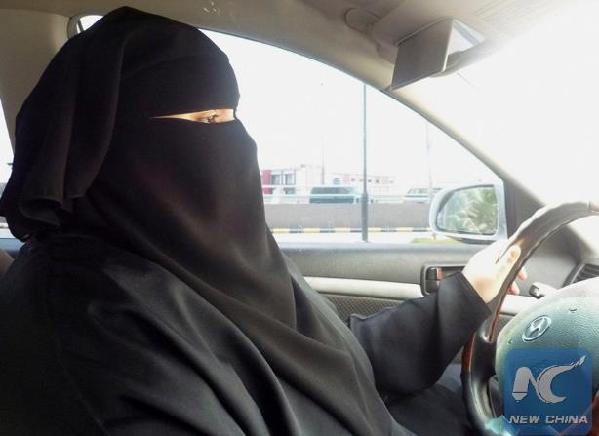Saudi Arabia's 'glasnost' moment
- By Sajjad Malik
 0 Comment(s)
0 Comment(s) Print
Print E-mail China.org.cn, September 30, 2017
E-mail China.org.cn, September 30, 2017
September 2017 will be long-remembered in Saudi Arabia due to a couple of historic steps introduced in the conservative kingdom, the most important being the royal decree allowing women to drive.
|
|
|
Umm Ibrahim sits behind the wheel of her vehicle as she drives in Riyadh, an act that is banned in Saudi Arabia June 21, 2011. [Xinhua file photo] |
Saudi Arabia was the only country in the world where women could not apply for a driving license and faced arrest if found behind the wheel. A couple of daring souls who defied the ban in the past landed in prison.
The end of this ban is not the only reform step taken this month, as earlier the government also lifted the prohibition on voice calls via Skype, WhatsApp and other applications forming the cheapest mode of modern communications, which applied to both Saudi citizens and others living in the country.
Since every year millions of Muslims make a pilgrimage to Saudi holy places, it is a major concession allowing them to reach out to their families back home any time by using social media free of charge.
In another move this month, the government banned a cleric for insulting the country's womenfolk. Saad al-Hijri, head of fatwas (legal-religious opinions) in Saudi Arabia's Assir province, was suspended from all religious activity after saying the brain of a woman shrinks to a quarter the size of a man's when she goes out for shopping and also opposing an end to the ban on women drivers.
In addition, women were allowed for the first time to participate in national day celebrations. Videos and photographs showing women enjoying themselves in the King Fahad Stadium in Riyadh were a welcome sign for the female half of the country.
Human rights supporters and women activists have been campaigning for years to get rid of archaic tribal practices like banning women from driving, or disallowing mixed gatherings where women could feature in public events along their menfolk.
These developments show that Saudi Arabia is changing faster than many analysts could have imagined. And the man responsible for all this is the young Crown Prince, Mohammad bin Salman, also known as MBS. Since bursting onto the national scene a couple of years ago, the prince has embarked on an ambitious program of reforms to transform the economy and society of the country by 2030.
MBS has quite rightly realized that the oil reserves are not unlimited, and also that in a couple of decades, their importance could be considerably reduced due to cheaper and cleaner alternative sources of energy. Hence, Saudi Arabia should act now to remain relevant.
He has started the drive to transform the economy. However, such a transformation was not going to happen without groundbreaking changes in the existing social system that keeps half of population away from work or contributing positively to national development.
Hence, steps like removing ban on female drivers and allowing them to go out and contribute in various sectors of national life is a key measure. It opens up a new source of talent and adds new energy to the social system of the country.
As Saudi Arabia broadens its brand of "glasnost" national reform, there are several visible and invisible bumps in the road ahead. We all know what happened to the USSR when Mikhail Gorbachev unleashed the forces of openness in 1980s in a bid to change the country.
While the international community is heaping praise on Saudi Arabia for its new initiatives, they could face massive domestic opposition from religious leaders and tribal elders opposed to any reform seen as challenging their authority.
The country may also face some kind of covert opposition from fellow Arab nations in the region as the reform and rise of the Kingdom would pose a threat to their own economic status. Saudi Arabia has a huge advantage, as already it attracts millions as part of religious tourism.
If it can add worldly attractions on the pattern of the UAE or Egypt, the influx of annual visitors would further swell. However, MBS should be alert for pitfalls as he goes ahead with his visionary reform agenda, especially as each new measure further raises public expectations.
It would be interesting to see how the Saudi glasnost proceeds in the coming years. The successful transformation coupled with the mainstreaming of women and other vulnerable segments could serve as a model for other conservative Muslim societies.
Sajjad Malik is a columnist with China.org.cn. For more information please visit:
http://www.china.org.cn/opinion/SajjadMalik.htm
Opinion articles reflect the views of their authors, not necessarily those of China.org.cn.







Go to Forum >>0 Comment(s)